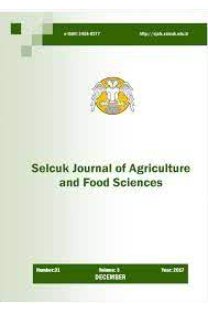Bor ve Çinko Uygulamasının Bazı Bodur Fasulye (Phaseolus Vulgaris L.) Genotiplerinin Biyolojik Verim Değerlerine Etkisi
Bu çalışma bazı bodur fasulye genotiplerine bor ve çinko uygulamalarının biyolojik verim değerleri üzerine etkisini araş-tırmak amacıyla yapılmıştır. Araştırmada Türkiye’de ekimi yapılan tescilli ve yerel popülasyon niteliğindeki 25 bodur fasulye genotipi materyal olarak kullanılmış ve genotiplere üç bor (0, 5, 10 mg kg-1) ve üç çinko (0, 5, 10 mg kg-1) dozu uygulanmıştır. Deneme kontrollü sera şartlarında tesadüf parsellerinde faktöriyel deneme desenine göre üç tekerrürlü olarak yürütülmüştür.
Fasulye genotipleri bor ve çinko uygulamalarından önemli ölçüde etkilenmiştir. Bor uygulamasıyla fasulye genotiplerinin biyolojik verim değerlerinin değerlendirilmesinde Eskişehir - 855, Karacaşehir-90, Noyanbey, Terzibaba, Yakutiye, Fasulye Sıra, Yalova-17, Romano, Nazende, Seminis Gina, Yunus-90, Akman-98, Zülbiye, Horoz Fasulye ve Kanada bor noksanlığına toleranslı genotipler, Şehirali-90, Göynük-98, Akdağ, Şahin-90, Önceler-98, Aras-98, Sarıkız, Magnum, May Gina ve Efsane genotiplerinin ise bor noksanlığına hassas genotipler olduğu, çinko uygulamasının biyolojik verim değerleri üzerine etkisinin genotiplere bağlı olarak değiştiği, buna göre çinko noksanlığına Akman-98, Karacaşehir-90, Noyanbey, Terzibaba, Şahin-90, Horoz Fasulye, Nazende ve Efsane genotiplerinin toleranslı; Göynük-98, Aras-98 ve Fasulye sıra genotiplerinin orta tolerans-lı; Eskişehir-855, Yunus-90, Şehirali-90, Önceler-98, Zülbiye, Yakutiye, Romano ve Kanada genotiplerinin orta hassas; Akdağ, Sarıkız, Magnum, Seminis Gina, May Gina ve Yalova-17 genotiplerinin ise çok hassas olduğu belirlenmiştir.
Effect of Boron and Zinc Applications on Biomass Values of Dwarf Bean (Phaseolus Vulgaris L.) Genotypes
This study was conducted in order to determine the effects of boron (B) and zinc (Zn) applications on biomass values of the plants of the dwarf bean species. A total of 25 dwarf bean species, registered and local populations, were grown for 3 B and 3 Zn doses (0, 5, 10 mg kg-1). The trial was conducted in three replicates within a controlled glasshouse according to randomized plots factorial design.
Results have shown that B and Zn applications considerably affect on the biomass values of dwarf dry bean varieties. From the species used, Eskişehir-855, Karacaşehir-90, Noyanbey, Terzibaba, Yakutiye, Fasulye Sıra, Yalova-17, Romano, Nazende, Seminis Gina Yunus-90, Akman-98, Zülbiye, Horoz Fasulye and Kanada were found to be resistant to B deficiency while Şehirali-90, Göynük-98, Akdağ, Şahin-90, Önceler-98, Aras-98, Sarıkız, Magnum, May Gina and Efsane were the sensi-tive species. Zinc x variety interaction was found significant from the stand point of biomass was considered. Akman-98, Kara-caşehir-90, Noyanbey, Terzibaba, Şahin-90, Horoz Fasulye, Nazende and Efsane were tolerant to Zn deficiency, while Göynük-98, Aras-98 and Fasulye Sıra were moderately tolerant. On the other hand, Eskişehir-855, Yunus-90, Şehirali-90, Önceler-98, Zülbiye, Yakutiye, Romano and Kanada varieties were moderately sensitive to Zn deficiency, while the species of Akdağ, Sarıkız, Magnum, Seminis Gina, May Gina and Yalova-17 were highly sensitive.
